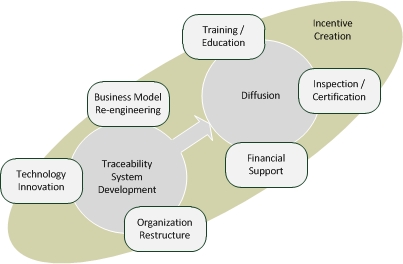Diffuse Traceability Across Food Industry
The implementation of traceability in food industry has been required as mandatory in some countries. In Europe for instance, the General Food Law entered into force in 2002 which makes traceability compulsory for all food and feed businesses. The enforcement from governments can undoubtedly drive food firms to implement traceability. However, not every country has this legal requirement in place (in fact, many countries do not have it). In such case, traceability diffusion across food industry is a great challenge. For example, a research on a failed case in Taiwan in 2004 shows a very low participation when there are no legal requirements.
Implementing traceability can bring a number of great benefits to a firm, in addition to improving safety. For example, it can increase vertical coordination, improve inventory management, satisfy consumer demand, and reduce the product recall cost. Despite these advantages, food firms have major concerns on a variety of factors including the cost benefit, organizational impact and process reengineering that implementing traceability may bring. Lack of financial support, knowledge, and technical personnel can also makes food firms reluctant to implement traceability. Traceability diffusion needs a cost-effective solution and, most importantly, it requires incentives for firms to move forward in its implementation.
Having studied comprehensively on numerous industry cases in different sectors in different territories, we generate a framework that supports traceability diffusion across industry.

The framework consists of six core modules grouped into two key stages. As illustrated in Figure, the first key stage – traceability system development – contains the technology innovation, business model re-engineering and organization restructure modules. These modules aim to build a solid foundation containing a cost-effective technical solution in addition to a streamlined business process and structure to support the diffusion. The second key stage – diffusion – contains the training/education, inspection/certification and financial support modules. In the case of traceability is not required by law, how to incentivize firms is set as a main objective and is targeted by all six core modules.
Comparing to some existing frameworks of traceability implementation, the framework illustrated above not only aims at producing an engineering and technical solution, but also focuses on economic and organizational considerations. Most importantly, the success of the implementation in the existing industry cases is largely based on the premise that the food firms are willing to adopt traceability, the issue of how to motivate the firms in case of resistance is unaddressed. In contrast, we set incentive creation as a main objective that is achieved through different function modules.
We work closely with Chinese partners to diffuse traceability system in China. This framework has been tailored and applied in Chinese food industry as an initiative. So far, it has achieved great result since its official launch in June 2012.

-
Utility Company Business Growth Model and Decision Support System
Finding power to supply its customers is the first thing a newly established utility company needs to do. Electricity can be purchased either from the network or from an energy producer directly. The... -
A Brief View of Business Intelligence
The Data Warehouse Institute defines Business Intelligence as the processes, technologies and tools needed to turn data into information and information into knowledge and knowledge into plans that dri... -
Whole Life Costing Model in Asset Management
In asset management, the whole life costing model is normally initiated to meet the following two broad strategic objectives: to ensure sufficient funding is available to maintain the asset portfolio... -
Apply Artificial Intelligence in Retail Promotion to Reduce Food Waste
Artificial intelligence (AI) is an academic field that studies how to create computers and computer software which are capable of intelligent behavior. The major concerns of AI research include reason... -
A Conceptual Framework for Reducing Consumer Food Waste
Our framework is based on the concept of a closed-loop control system from control engineering. It employs the Internet of Things (IoT) sensor network to realize a closed-loop consumer food consumptio... -
Diffuse Traceability Across Food Industry
The implementation of traceability in food industry has been required as mandatory in some countries. In Europe for instance, the General Food Law entered into force in 2002 which makes traceability c... -
A Centralized Traceability System for SMEs
Our centralized traceability system (CTS) consists of three function modules: traceability server, database server and web portal. It creates very few overheads for supply chain partners as the server...








